Abstract
Calcium ion plays a major regulatory role in many hormone-stimulated systems. To determine the site of calcium's action in the toad urinary bladder, we examined the effect of trifluoperazine, a compound that binds specifically to the calcium binding protein, calmodulin, and thereby prevents activation of enzymes by the calcium- calmodulin complex. 10 microM trifluoperazine inhibited vasopressin stimulation of water flow, but did not alter vasopressin's effects on urea permeability or short-circuit current. Trifluoperazine also blocked stimulation of water flow by cyclic AMP and methylisobutylxanthine, implying a "postcyclic AMP" site of action. Consistent with these results, trifluoperazine did not decrease epithelial cyclic AMP content or the cyclic AMP-dependent protein kinase activity ratio. Assay of bladder epithelial supernate demonstrated calmodulin-like activity of 1.5 U/microgram protein. Morphologic studies of vasopressin-treated bladders revealed that trifluoperazine did not alter the volume density of cytoplasmic microtubules or significantly decrease the number of fusions between cytoplasmic, aggregate-containing, elongated vesicles and the luminal membrane. Nonetheless, the frequency of luminal membrane aggregates, structures that correlate well with luminal membrane water permeability, was decreased by greater than 50%. Thus, trifluoperazine appears to inhibit the movement of intramembranous particle aggregates from the fused intracellular membranes to the luminal membrane, perhaps by blocking an effect of calcium on microfilament function.
Full text
PDF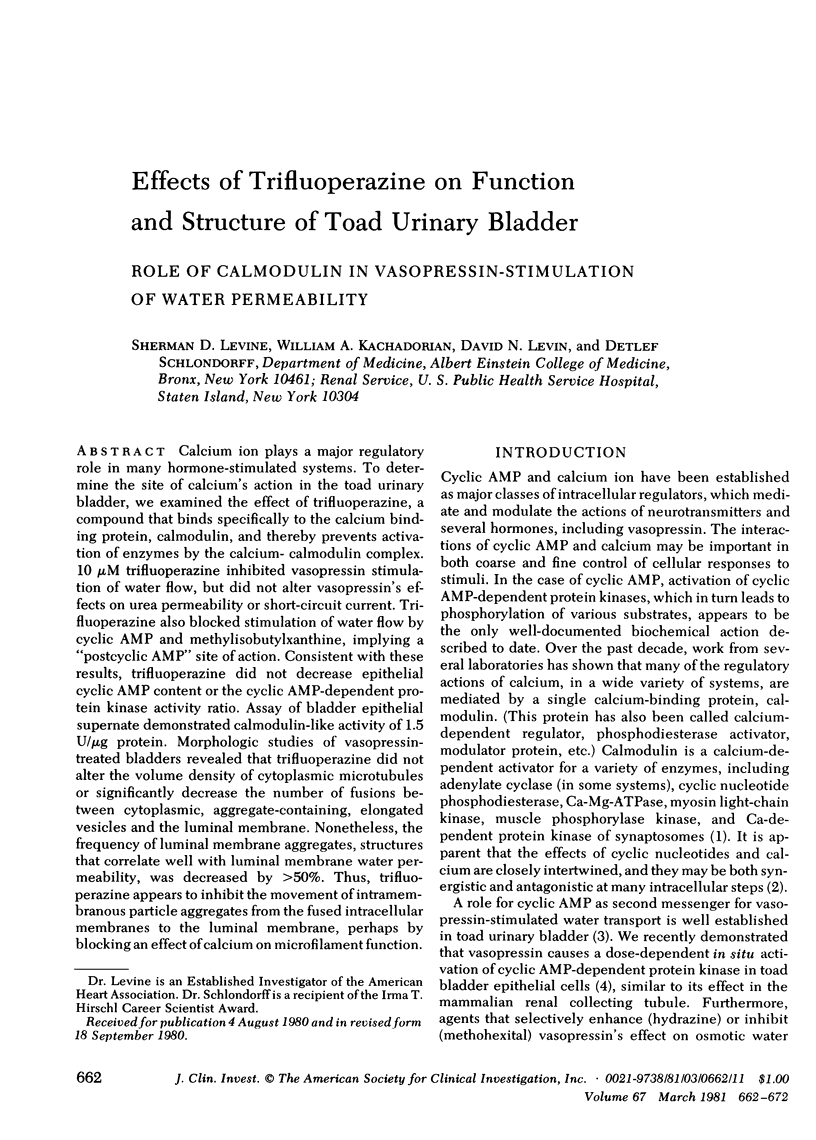
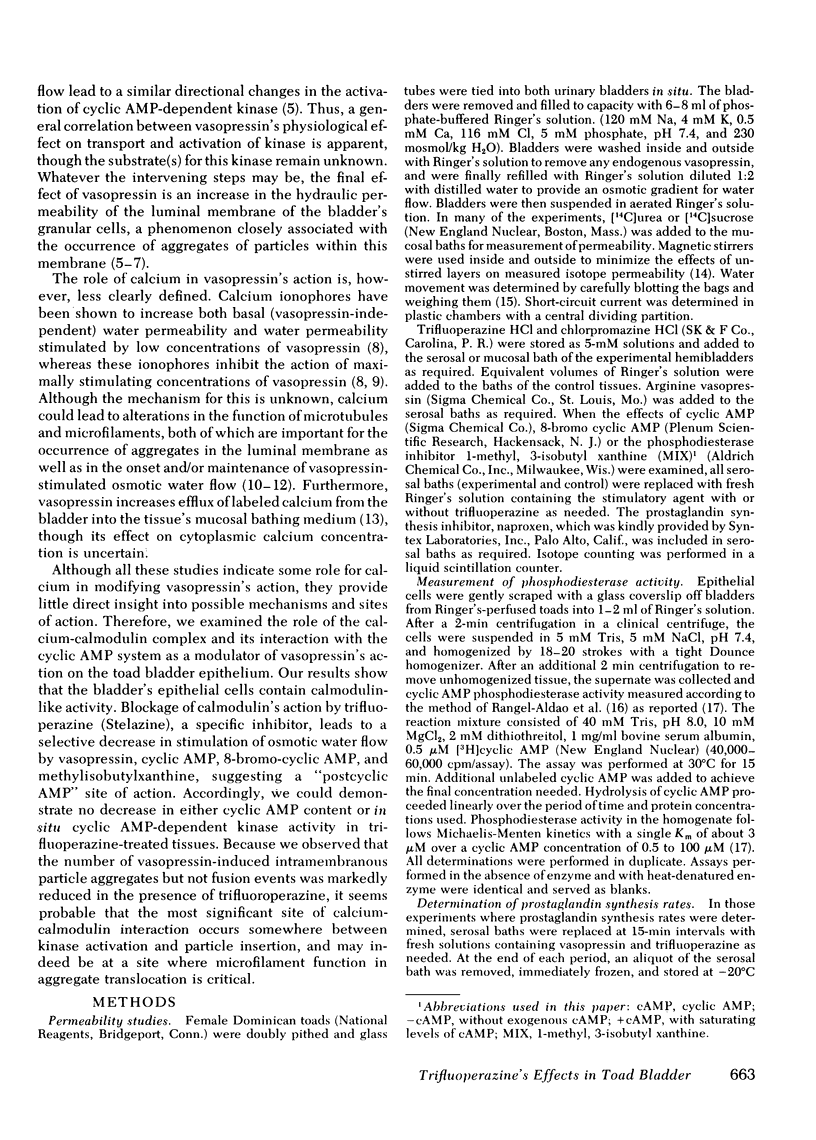
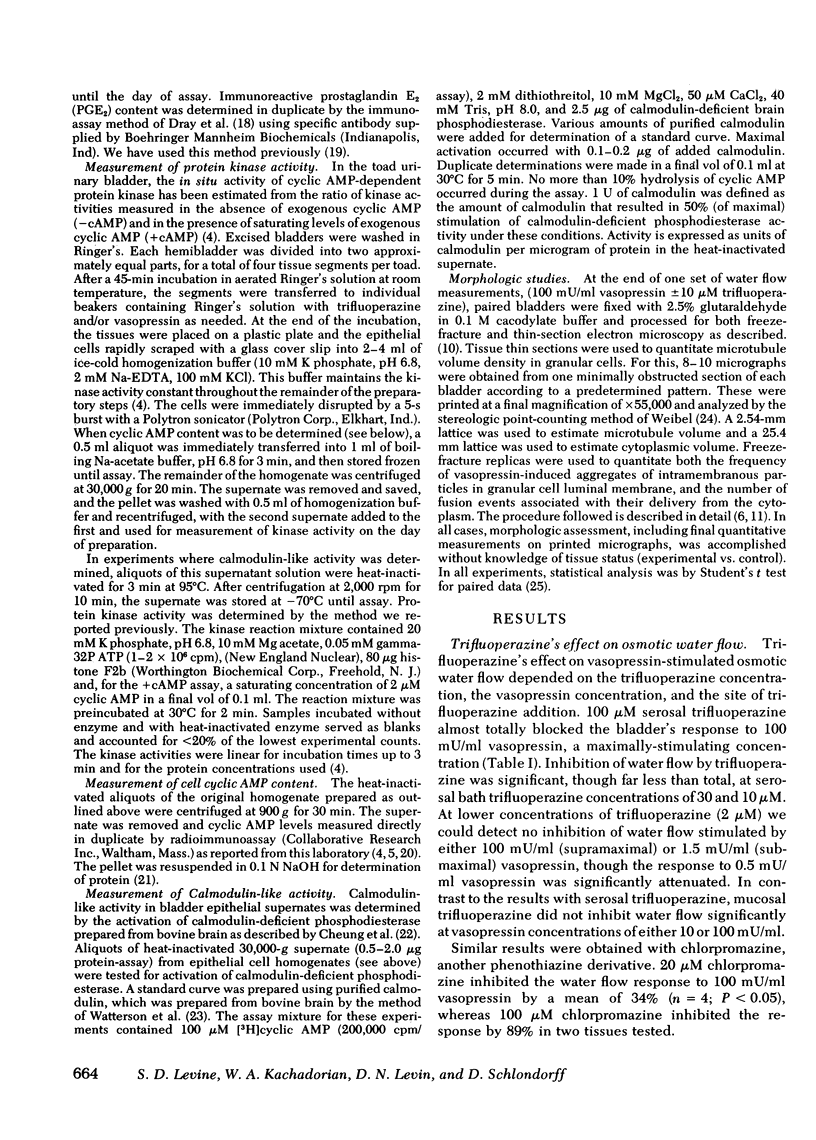
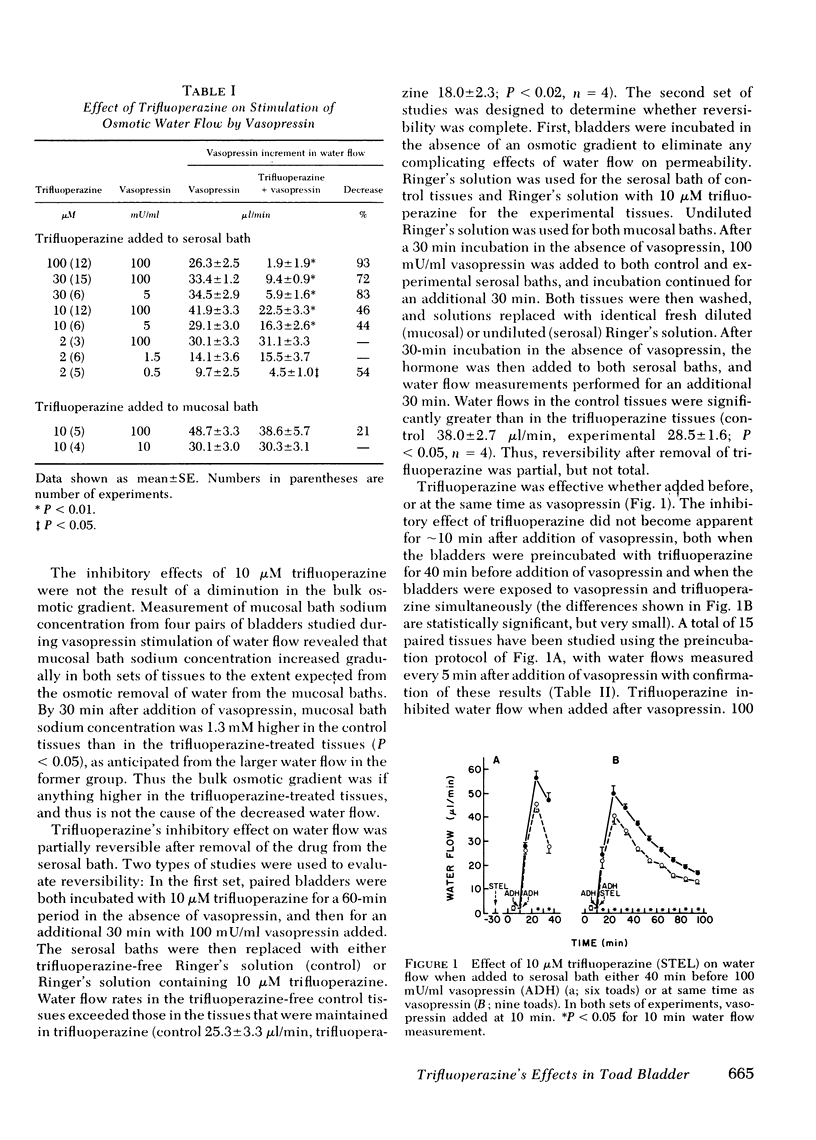
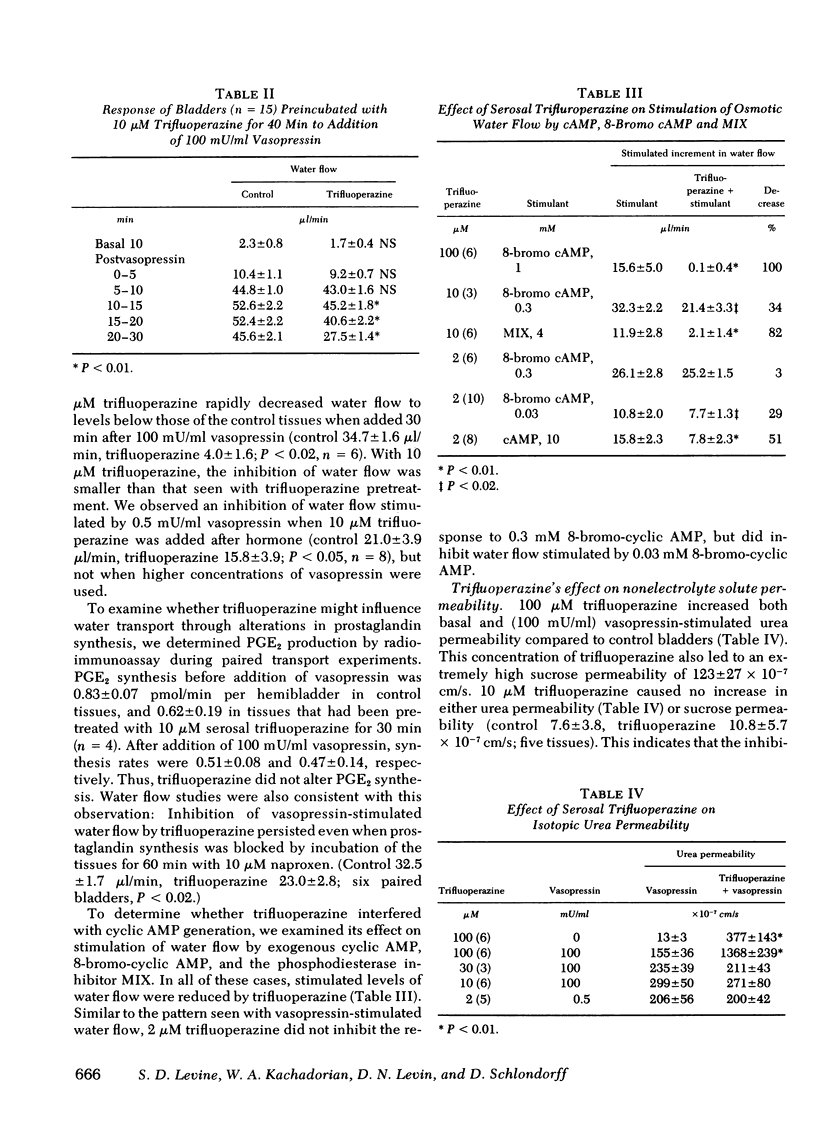
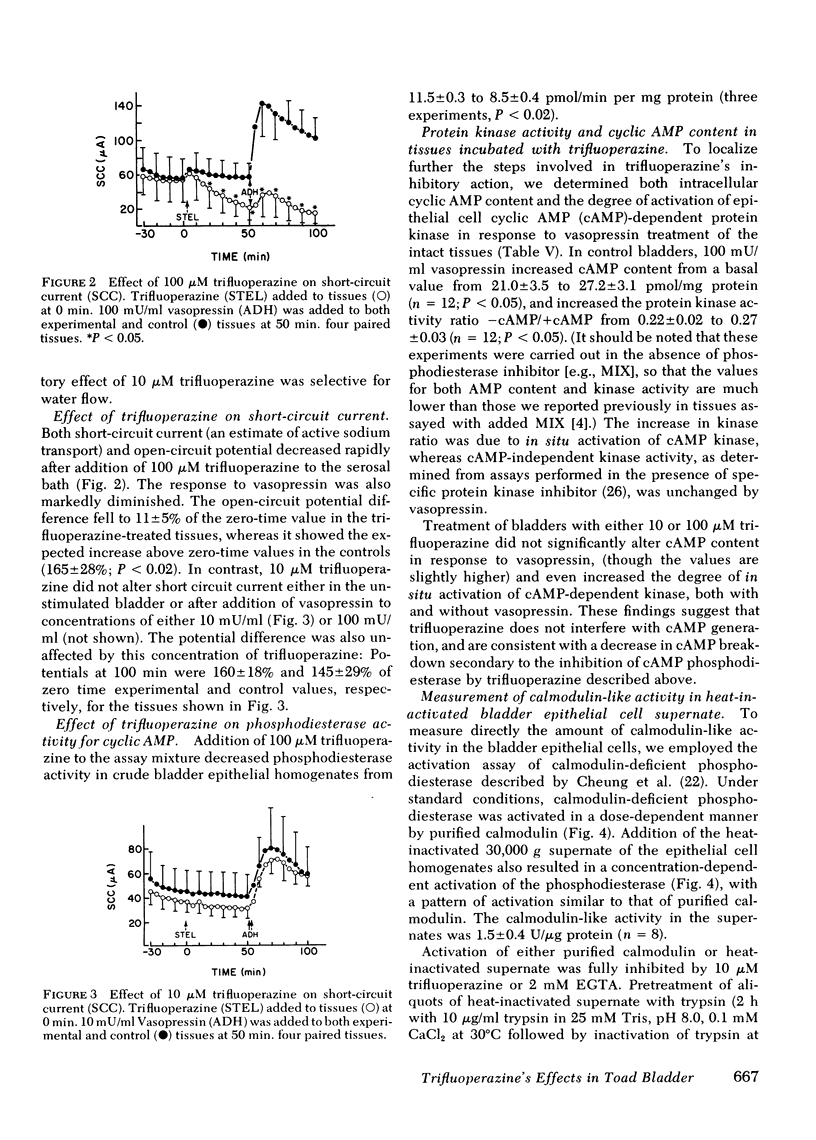
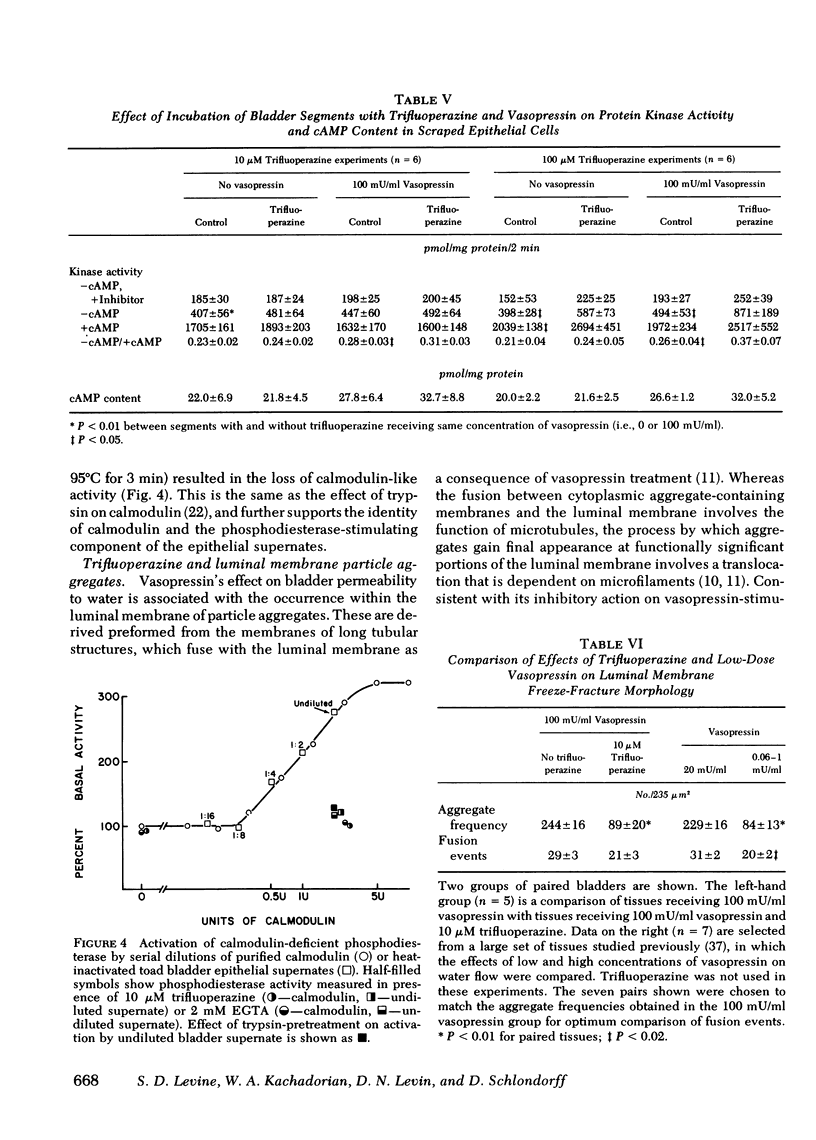
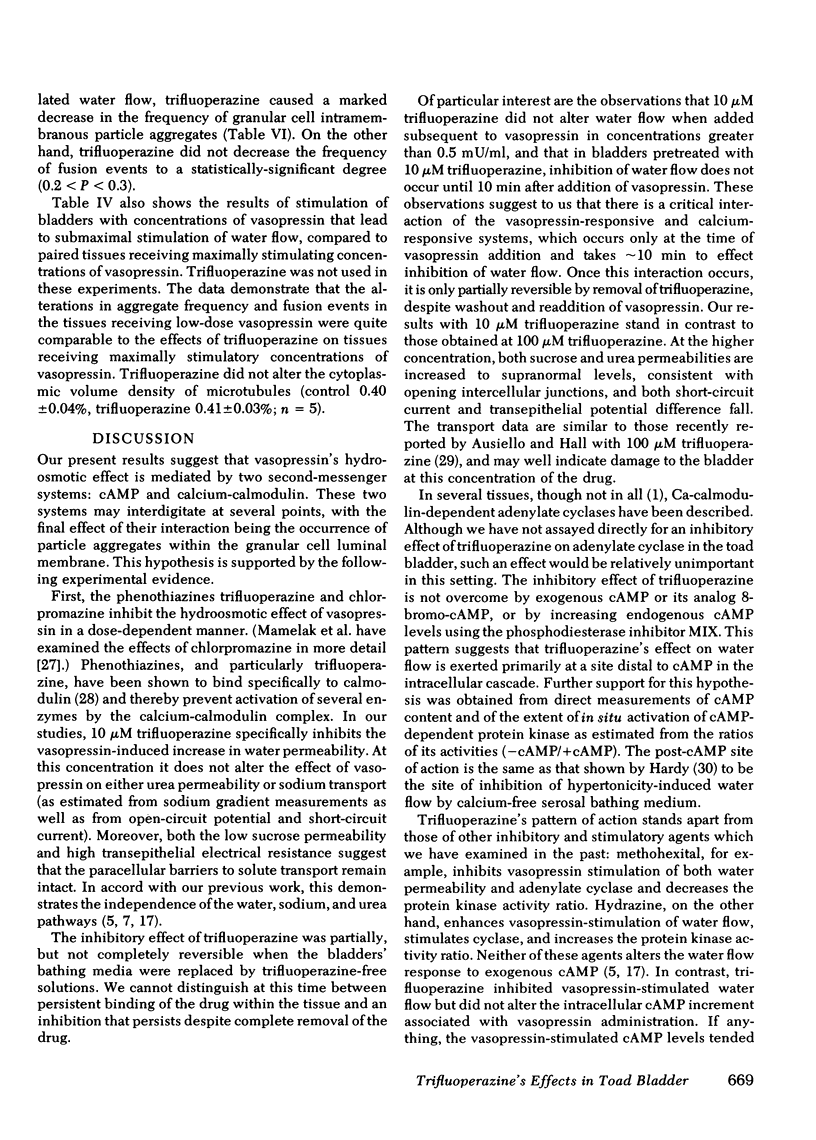
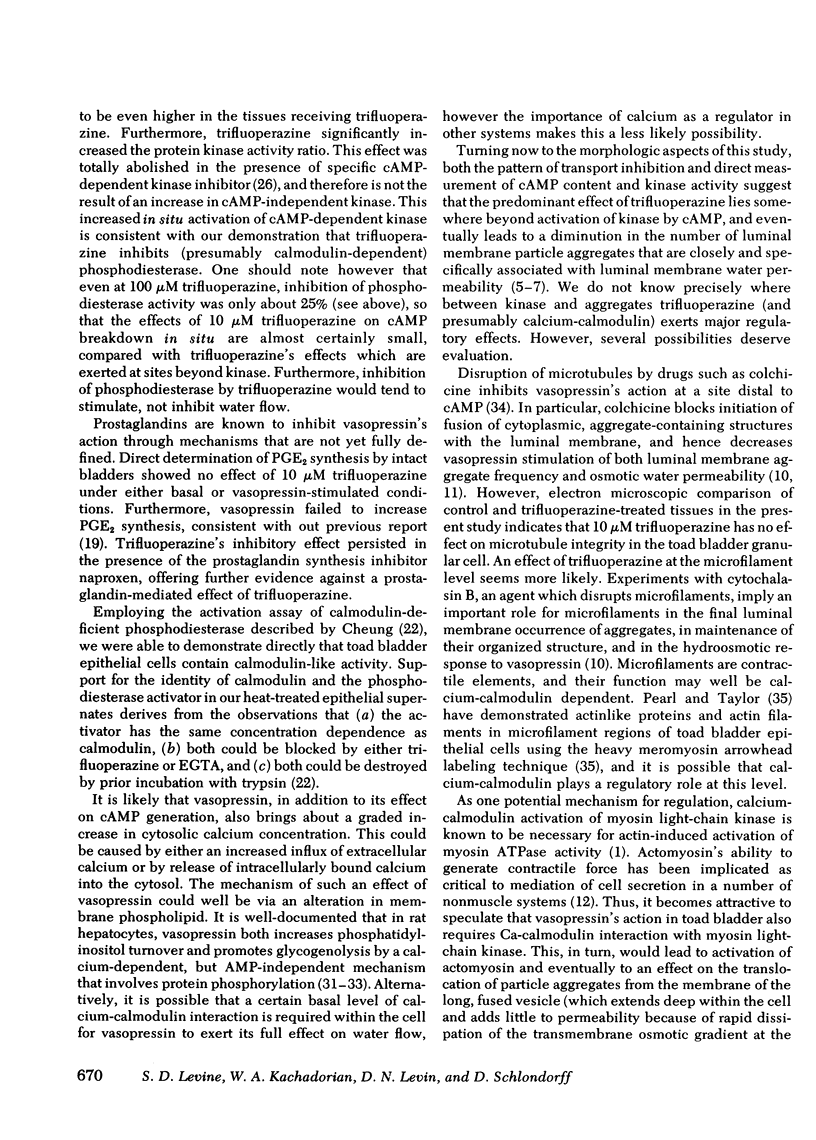
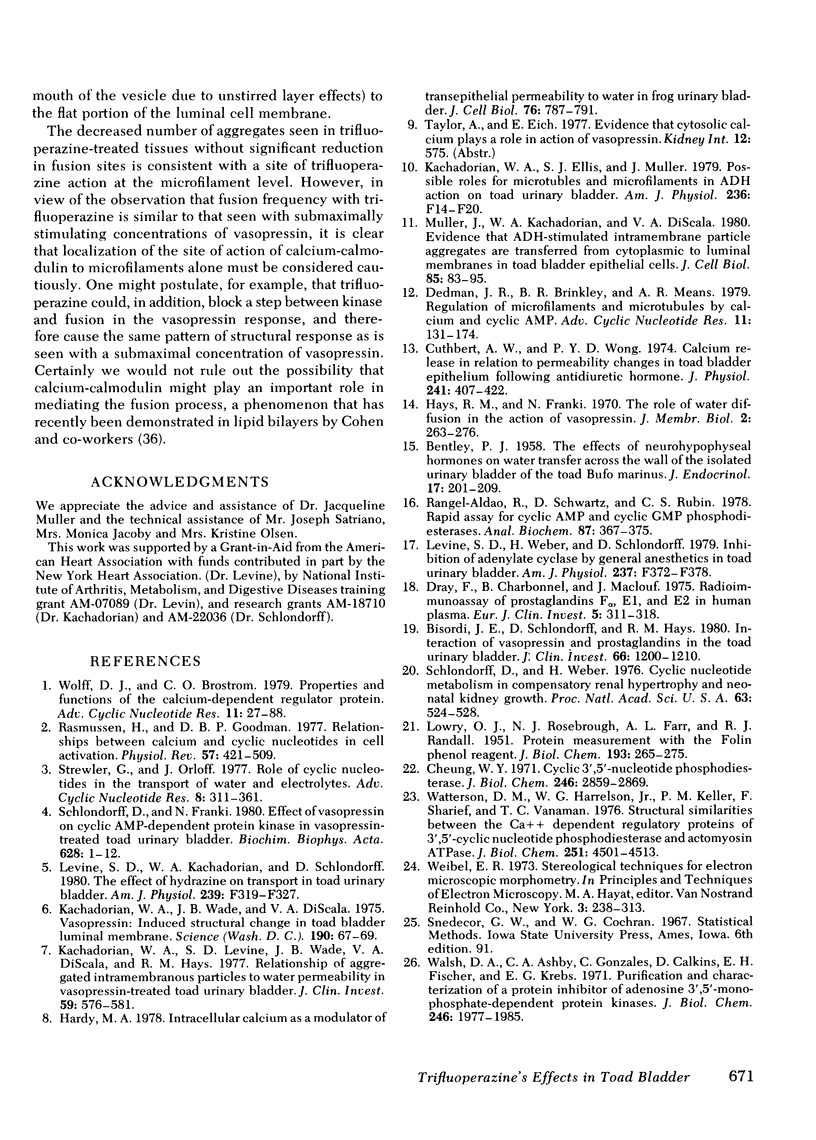
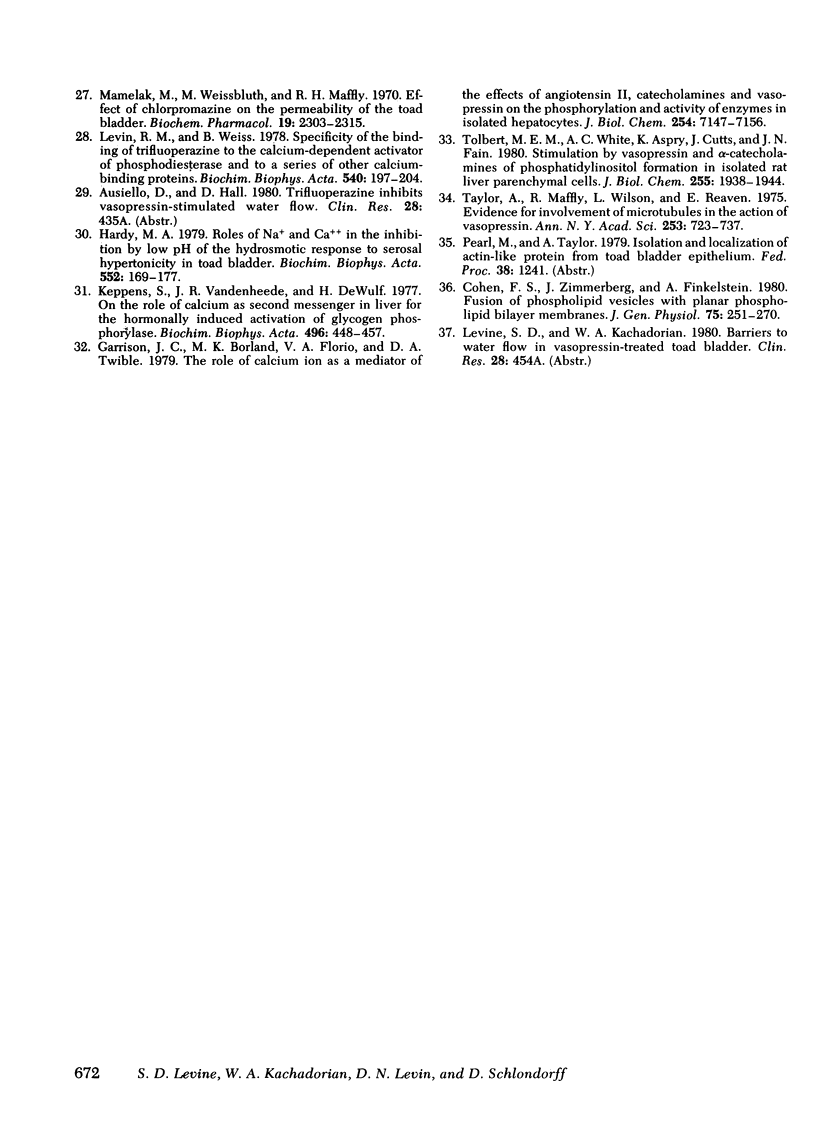
Selected References
These references are in PubMed. This may not be the complete list of references from this article.
- BENTLEY P. J. The effects of neurohypophysial extracts on the water transfer across the wall of the isolated urinary bladder of the toad Bufo marinus. J Endocrinol. 1958 Sep;17(3):201–209. doi: 10.1677/joe.0.0170201. [DOI] [PubMed] [Google Scholar]
- Bisordi J. E., Schlondorff D., Hays R. M. Interaction of vasopressin and prostaglandins in the toad urinary bladder. J Clin Invest. 1980 Dec;66(6):1200–1210. doi: 10.1172/JCI109971. [DOI] [PMC free article] [PubMed] [Google Scholar]
- Cheung W. Y. Cyclic 3',5'-nucleotide phosphodiesterase. Evidence for and properties of a protein activator. J Biol Chem. 1971 May 10;246(9):2859–2869. [PubMed] [Google Scholar]
- Cohen F. S., Zimmerberg J., Finkelstein A. Fusion of phospholipid vesicles with planar phospholipid bilayer membranes. II. Incorporation of a vesicular membrane marker into the planar membrane. J Gen Physiol. 1980 Mar;75(3):251–270. doi: 10.1085/jgp.75.3.251. [DOI] [PMC free article] [PubMed] [Google Scholar]
- Cuthbert A. W., Wong P. Y. Calcium release in relation to permeability changes in toad bladder epithelium following antidiuretic hormone. J Physiol. 1974 Sep;241(2):407–422. doi: 10.1113/jphysiol.1974.sp010663. [DOI] [PMC free article] [PubMed] [Google Scholar]
- Dedman J. R., Brinkley B. R., Means A. R. Regulation of microfilaments and microtubules by calcium and cyclic AMP. Adv Cyclic Nucleotide Res. 1979;11:131–174. [PubMed] [Google Scholar]
- Dray F., Charbonnel B., Maclouf J. Radioimmunoassay of prostaglandins Falpha, E1 and E2 in human plasma. Eur J Clin Invest. 1975 Jul 29;5(4):311–318. doi: 10.1111/j.1365-2362.1975.tb00459.x. [DOI] [PubMed] [Google Scholar]
- Garrison J. C., Borland M. K., Florio V. A., Twible D. A. The role of calcium ion as a mediator of the effects of angiotensin II, catecholamines, and vasopressin on the phosphorylation and activity of enzymes in isolated hepatocytes. J Biol Chem. 1979 Aug 10;254(15):7147–7156. [PubMed] [Google Scholar]
- Hardy M. A. Intracellular calcium as a modulator of transepithelial permeability to water in frog urinary bladder. J Cell Biol. 1978 Mar;76(3):787–791. doi: 10.1083/jcb.76.3.787. [DOI] [PMC free article] [PubMed] [Google Scholar]
- Hardy M. A. Roles of Na+ and Ca2+ in the inhibition by low pH of the hydrosmotic response to serosal hypertonicity in toad bladder. Biochim Biophys Acta. 1979 Mar 23;552(1):169–177. doi: 10.1016/0005-2736(79)90255-4. [DOI] [PubMed] [Google Scholar]
- Kachadorian W. A., Ellis S. J., Muller J. Possible roles for microtubules and microfilaments in ADH action on toad urinary bladder. Am J Physiol. 1979 Jan;236(1):F14–F20. doi: 10.1152/ajprenal.1979.236.1.F14. [DOI] [PubMed] [Google Scholar]
- Kachadorian W. A., Levine S. D., Wade J. B., Di Scala V. A., Hays R. M. Relationship of aggregated intramembranous particles to water permeability in vasopressin-treated toad urinary bladder. J Clin Invest. 1977 Mar;59(3):576–581. doi: 10.1172/JCI108673. [DOI] [PMC free article] [PubMed] [Google Scholar]
- Kachadorian W. A., Wade J. B., DiScala V. A. Vasopressin: induced structural change in toad bladder luminal membrane. Science. 1975 Oct 3;190(4209):67–69. doi: 10.1126/science.809840. [DOI] [PubMed] [Google Scholar]
- Keppens S., Vandenheede J. R., De Wulf H. On the role of calcium as second messenger in liver for the hormonally induced activation of glycogen phosphorylase. Biochim Biophys Acta. 1977 Feb 28;496(2):448–457. doi: 10.1016/0304-4165(77)90327-0. [DOI] [PubMed] [Google Scholar]
- LOWRY O. H., ROSEBROUGH N. J., FARR A. L., RANDALL R. J. Protein measurement with the Folin phenol reagent. J Biol Chem. 1951 Nov;193(1):265–275. [PubMed] [Google Scholar]
- Levin R. M., Weiss B. Specificity of the binding of trifluoperazine to the calcium-dependent activator of phosphodiesterase and to a series of other calcium-binding proteins. Biochim Biophys Acta. 1978 May 3;540(2):197–204. doi: 10.1016/0304-4165(78)90132-0. [DOI] [PubMed] [Google Scholar]
- Levine S. D., Kachadorian W. A., Verna N. C., Schlondorff D. Effect of hydrazine on transport on toad urinary bladder. Am J Physiol. 1980 Oct;239(4):F319–F327. doi: 10.1152/ajprenal.1980.239.4.F319. [DOI] [PubMed] [Google Scholar]
- Levine S. D., Weber H., Schlondorff D. Inhibition of adenylate cyclase by general anesthetics in toad urinary bladder. Am J Physiol. 1979 Nov;237(5):F372–F378. doi: 10.1152/ajprenal.1979.237.5.F372. [DOI] [PubMed] [Google Scholar]
- Mamelak M., Weissbluth M., Maffly R. H. Effect of chlorpromazine on permeability of the toad bladder. Biochem Pharmacol. 1970 Jul;19(7):2303–2315. doi: 10.1016/0006-2952(70)90129-2. [DOI] [PubMed] [Google Scholar]
- Muller J., Kachadorian W. A., DiScala V. A. Evidence that ADH-stimulated intramembrane particle aggregates are transferred from cytoplasmic to luminal membranes in toad bladder epithelial cells. J Cell Biol. 1980 Apr;85(1):83–95. doi: 10.1083/jcb.85.1.83. [DOI] [PMC free article] [PubMed] [Google Scholar]
- Rangel-Aldao R., Schwartz D., Rubin C. S. Rapid assay for cyclic AMP and cyclic GMP phosphodiesterases. Anal Biochem. 1978 Jul 1;87(2):367–375. doi: 10.1016/0003-2697(78)90686-3. [DOI] [PubMed] [Google Scholar]
- Rasmussen H., Goodman D. B. Relationships between calcium and cyclic nucleotides in cell activation. Physiol Rev. 1977 Jul;57(3):421–509. doi: 10.1152/physrev.1977.57.3.421. [DOI] [PubMed] [Google Scholar]
- Schlondorff D., Franki N. Effect of vasopressin on cyclic AMP-dependent protein kinase in toad urinary bladder. Biochim Biophys Acta. 1980 Feb 21;628(1):1–12. doi: 10.1016/0304-4165(80)90345-1. [DOI] [PubMed] [Google Scholar]
- Schlondorff D., Weber H. Cyclic nucleotide metabolism in compensatory renal hypertrophy and neonatal kidney growth. Proc Natl Acad Sci U S A. 1976 Feb;73(2):524–528. doi: 10.1073/pnas.73.2.524. [DOI] [PMC free article] [PubMed] [Google Scholar]
- Strewler G. J., Orloff J. Role of cyclic nucleotides in the transport of water and electrolytes. Adv Cyclic Nucleotide Res. 1977;8:311–361. [PubMed] [Google Scholar]
- Taylor A., Maffly R., Wilson L., Reaven E. Evidence for involvement of microtubules in the action of vasopressin. Ann N Y Acad Sci. 1975 Jun 30;253:723–737. doi: 10.1111/j.1749-6632.1975.tb19241.x. [DOI] [PubMed] [Google Scholar]
- Tolbert M. E., White A. C., Aspry K., Cutts J., Fain J. N. Stimulation by vasopressin and alpha-catecholamines of phosphatidylinositol formation in isolated rat liver parenchymal cells. J Biol Chem. 1980 Mar 10;255(5):1938–1944. [PubMed] [Google Scholar]
- Walsh D. A., Ashby C. D., Gonzalez C., Calkins D., Fischer E. H. Krebs EG: Purification and characterization of a protein inhibitor of adenosine 3',5'-monophosphate-dependent protein kinases. J Biol Chem. 1971 Apr 10;246(7):1977–1985. [PubMed] [Google Scholar]
- Watterson D. M., Harrelson W. G., Jr, Keller P. M., Sharief F., Vanaman T. C. Structural similarities between the Ca2+-dependent regulatory proteins of 3':5'-cyclic nucleotide phosphodiesterase and actomyosin ATPase. J Biol Chem. 1976 Aug 10;251(15):4501–4513. [PubMed] [Google Scholar]
- Wolff D. J., Brostrom C. O. Properties and functions of the calcium-dependent regulator protein. Adv Cyclic Nucleotide Res. 1979;11:27–88. [PubMed] [Google Scholar]


